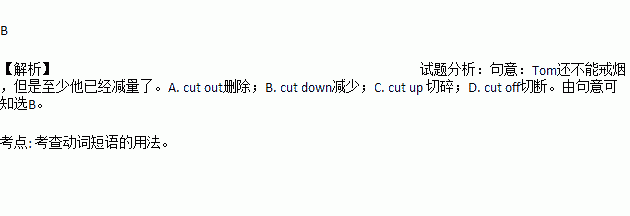题目内容
My uncle hasn't been able to quit smoking, but at least he has______.
A. cut out B. cut down
C. cut up D. cut off
What is waste and why does it matter?
Waste or rubbish is something that people throw away because they no longer need it or want it. Almost everything we do creates waste and as a society we are currently producing more waste than ever before. We do this at home and at work. The fact that we produce waste, and get rid of it, matters for the following reasons.
When something is thrown away we lose the natural resources, the energy and the time which have been used to make the product. The vast majority of resources that we use in manufacturing products and providing services cannot be replaced. The use of these resources cannot go on indefinitely— we would run out.
When something is thrown away, we are putting pressure on the environment's ability to cope— in terms of the additional environmental impacts associated with extracting the new resources, manufacturing and distributing the goods, and in terms of the environmental impacts associated with getting rid of our rubbish.
When something is thrown away, we are not able to see it as a resource. It is well understood that what is waste to one person may not be viewed as waste by another. A good example of this is scrap metal(金属废料)which has been recycled for many years. Increasingly people are realizing that it makes economic sense as well as environmental sense to use "waste" rather than just throw it away.
The process of using up the earth's natural resources to make products which we then throw away, sometimes a very short time later, is not "sustainable" — in other words, it cannot continue indefinitely.
The way we consume materials will affect whether we have a sustainable society that leaves resources available for future generations to use. As consumers and producers, we are central to the concept of sustainability. We need to think about how we can get more out of less, how we can use less and throw away less and how we can do better things with our so-called "waste" than throw it away. We need to see "waste" as a "resource".
Title | The problem with waste |
1. | Waste or rubbish is what people throw away when they do not need it or want it any longer. |
Important 2.on society | The natural resources, the energy and the time used to make the product become 3.when something is thrown away. The vast majority of resources can’t be replaced and they would be 4.up. The environment's ability to extract the new resources, manufacture and distribute the goods and get rid of rubbish is 5. pressure. People 6. to see it as a resource. Increasingly, people are realizing that it makes both economic sense and environmental sense to use "waste" 7.of just throwing it away. |
Result | We’ll leave fewer resources 8. for future generations to use. |
9. | People should have the 10. of sustainability, thinking about getting more out of less, using less, throwing less and doing better things with it. People should see "waste" as a "resource". |

